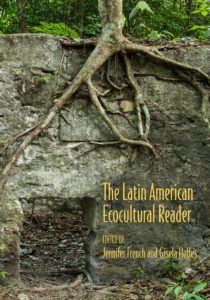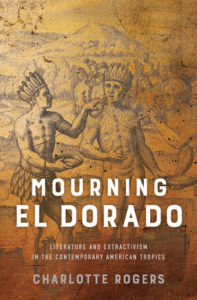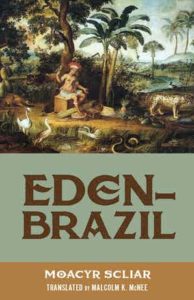By Laura Barbas-Rhoden & Gisela Heffes
1992: ASLE is founded. 1992: a year of remembrances, protests, and commemorations of resistance and resilience in Abya Yala, Turtle Island, the Americas. Events five hundred years before changed histories, narratives, and imaginaries. They generated entanglements that have given, shaped, and taken life in intricate and myriad ways. Latin American, Iberian, and Latinx environmental humanities query, interrogate, and forge those imaginaries. From just a few publications a decade ago, the field has grown into one of robust engagement, critique, creativity, and reflection. Texts authored, edited, and published in Brazil, Chile, Spain, and United States, among other regions, shape the contours of a fluid map of creative work and rigorous scholarship.
This piece is an invitation to engage (or engage further) with the most recent published work in the field by scholars affiliated with ASLE, as a means of deepening and broadening an understanding of the environmental humanities. ASLE-affiliated academics and writers in Latin American, Iberian, and Latinx environmental humanities constitute a diverse community of scholars engaged in a wide range of public projects, activism, investigation, and teaching. Their work has been crucial in bringing to the fore new research, taking original creative texts to new audiences, asserting that the world is not only multilingual but also a pluriverse, a world of many different worlds. The work featured here engages different historical periods, geographies, and genres; takes up canonical works never before read from an ecocritical angle; makes innovative interventions in pedagogy; translates; creates; grieves, remembers, and hopes.
 Latin American eco-cultural production, understood in a broad and sweeping sense, reaches new audiences through books forthcoming in fall of 2020. Jennifer French and Gisela Heffes’ The Latin American Eco-Cultural Reader is a comprehensive anthology of literary and cultural texts from Latin America about the natural world. With selections organized in eight chronological chapters, from the early colonial period to the present, it comprises works by canonical and lesser-known figures from the Spanish-speaking countries and Brazil. Climate change, extinction, extractivismo, and waste, among many others, are environmental problems that inform and intertwine sixty-four texts, which raise awareness about disastrous effects already being felt by local communities while, at the same, drawing attention to the knowledges and ethics of Indigenous communities and other traditionally land-based cultures. Victoria Saramago’s Fictional Environments explores the relationship between texts and contexts of the “developmentalism” period, a mid-twentieth-century period of accelerated urbanization and deforestation in Latin America, the effects of which are felt today. Her book considers how novels can interfere with the reality they attempt to depict. By focusing on the mimetic relations implicated in reading fictional works as cultural products that interact with and impact environmental policies, the book interrogates the role of literary works in our perception of environmental change.
Latin American eco-cultural production, understood in a broad and sweeping sense, reaches new audiences through books forthcoming in fall of 2020. Jennifer French and Gisela Heffes’ The Latin American Eco-Cultural Reader is a comprehensive anthology of literary and cultural texts from Latin America about the natural world. With selections organized in eight chronological chapters, from the early colonial period to the present, it comprises works by canonical and lesser-known figures from the Spanish-speaking countries and Brazil. Climate change, extinction, extractivismo, and waste, among many others, are environmental problems that inform and intertwine sixty-four texts, which raise awareness about disastrous effects already being felt by local communities while, at the same, drawing attention to the knowledges and ethics of Indigenous communities and other traditionally land-based cultures. Victoria Saramago’s Fictional Environments explores the relationship between texts and contexts of the “developmentalism” period, a mid-twentieth-century period of accelerated urbanization and deforestation in Latin America, the effects of which are felt today. Her book considers how novels can interfere with the reality they attempt to depict. By focusing on the mimetic relations implicated in reading fictional works as cultural products that interact with and impact environmental policies, the book interrogates the role of literary works in our perception of environmental change.
 Similarly, Mourning El Dorado: Literature and Extractivism in the Contemporary American Tropics by Charlotte Rogers takes on 20th and 21st century writers from different nations and linguistic traditions that engage with the legacy of extraction of natural resources in Latin America. In exploring the afterlives of the El Dorado legend, Rogers’ examination invites a revisiting of developmentalism and the Great Acceleration period of the Anthropocene era, namely the years since 1945, as well as writers’ critical engagement with this period. From an ecocritical angle, the book argues that authors such as Alejo Carpentier, Wilson Harris, Mario Vargas Llosa, Alvaro Mutis, and Milton Hatoum dismantle the promise of El Dorado and link it to harm that deeply marks both peoples and land.
Similarly, Mourning El Dorado: Literature and Extractivism in the Contemporary American Tropics by Charlotte Rogers takes on 20th and 21st century writers from different nations and linguistic traditions that engage with the legacy of extraction of natural resources in Latin America. In exploring the afterlives of the El Dorado legend, Rogers’ examination invites a revisiting of developmentalism and the Great Acceleration period of the Anthropocene era, namely the years since 1945, as well as writers’ critical engagement with this period. From an ecocritical angle, the book argues that authors such as Alejo Carpentier, Wilson Harris, Mario Vargas Llosa, Alvaro Mutis, and Milton Hatoum dismantle the promise of El Dorado and link it to harm that deeply marks both peoples and land.
Latinx Environmentalisms: Place, Justice, and the Decolonial, edited by Sarah D. Wald, David J. Vázquez, Priscilla Solis Ybarra, and Sarah Jaquette Ray, centers the experiences, knowledges, and ethics of subjects of colonization that have not been anchored in the same kind of exploitative relations with the natural world that white Western culture has. The book presents the thinking of scholars and writers that bring to the forefront how Latinx creativity integrates a critique of colonization and capital alongside engagement with the human relation to the natural world. In this way, the book unambiguously confronts contemporary discourses that justify exclusions by asserting that Latinx peoples contribute little by way of knowledge, insight, and positive practices. The collection rejects such characterizations and offers examples of unique epistemological contributions, as well as countless cultural practices and beliefs, that lead to better ways to dwell with one another.
Multiple recent articles push the boundaries of ecocriticism with new approaches and subjects of study. Roberto Forns Broggi’s articles, one on Miguel Gutiérrez’s Babel, el paraíso and another on Guillermo del Toro’s Cronos, are provocations that invite critical reflection about the relationship between technology and animals, between environmental sensibilities and subjects. In the same vein, Laura Barbas-Rhoden focuses on cinematic engagement with slow violence and spatial injustice in her ecocritical reading of Alfonso Cuarón’s Y tu mamá también and Fernando Eimbcke’s Temporada de patos. Adriana Méndez Rodenas takes up Humboldt’s cartography and writings to draw attention to the reality that the region he traversed with wonder is now one of environmental degradation. Elizabeth DeLoughrey and Tatiana Flores, in “Submerged Bodies. The Tidalectics of Representability and the Sea in Caribbean Art,” contribute to a “rich maritime grammar” that is developing across disciplines. Taken together, these scholarly projects urge attention to new vantage points and, indeed, different ways of sensing and reconceiving environmental humanities.
 ASLE as an organization has centered creative writing and conversations about meaningful pedagogical practices; these, too, are areas in which Latin American, Iberian, and Latinx environmental humanities work has also grown. Laura Barbas-Rhoden’s co-authored piece on “Environmental Literacy as a Global Literacy in Modern Languages: Lessons from a Liberal Arts College” draws attention to opportunities in modern languages departments to foster students’ engagement with environmental challenges that amplify and multiply existing inequalities and exclusions at every scale. Like teaching, new imaginations and perspectives help connect dots, and high-quality translations ensure important creative works reach new audiences. Malcolm K. McNee’s translation of Eden-Brazil, a novel by celebrated Brazilian writer Moacyr Scliar, brings to the English readership a tale of ecotourism with humor and wit. This tragicomic story relates the ideals of environmentalism to the realities of local politics, global consumer culture, and competing visions of authentic nature. The same complexities can be found in two new bilingual editions. El cero móvil de su boca / The Mobile Zero of Its Mouth is a collection of poems written by Gisela Heffes and translated by Grady C. Wray. Through the use of everyday images, the lines in the poems interweave stories of extinction and racism while instilling in the reader a sense of rare hope. Nuestros Antepasados y La Nueva Generación en SW Michigan: Querencia in the Latinx Midwest: Photography and Ethno-poetic, by Shelli Rottschafer and Daniel Combs, evokes “querencia” by connecting land with water (which sustains life). Querencia is a remembrance of one’s history, where one began. It calls upon a place of origin, yet it also transcends a want and desire for where our future will take us. Querencia follows the Latinx diaspora; wherever it lands, wherever it develops roots.
ASLE as an organization has centered creative writing and conversations about meaningful pedagogical practices; these, too, are areas in which Latin American, Iberian, and Latinx environmental humanities work has also grown. Laura Barbas-Rhoden’s co-authored piece on “Environmental Literacy as a Global Literacy in Modern Languages: Lessons from a Liberal Arts College” draws attention to opportunities in modern languages departments to foster students’ engagement with environmental challenges that amplify and multiply existing inequalities and exclusions at every scale. Like teaching, new imaginations and perspectives help connect dots, and high-quality translations ensure important creative works reach new audiences. Malcolm K. McNee’s translation of Eden-Brazil, a novel by celebrated Brazilian writer Moacyr Scliar, brings to the English readership a tale of ecotourism with humor and wit. This tragicomic story relates the ideals of environmentalism to the realities of local politics, global consumer culture, and competing visions of authentic nature. The same complexities can be found in two new bilingual editions. El cero móvil de su boca / The Mobile Zero of Its Mouth is a collection of poems written by Gisela Heffes and translated by Grady C. Wray. Through the use of everyday images, the lines in the poems interweave stories of extinction and racism while instilling in the reader a sense of rare hope. Nuestros Antepasados y La Nueva Generación en SW Michigan: Querencia in the Latinx Midwest: Photography and Ethno-poetic, by Shelli Rottschafer and Daniel Combs, evokes “querencia” by connecting land with water (which sustains life). Querencia is a remembrance of one’s history, where one began. It calls upon a place of origin, yet it also transcends a want and desire for where our future will take us. Querencia follows the Latinx diaspora; wherever it lands, wherever it develops roots.
Latin American, Iberian, and Latinx environmental humanities scholars’ contribution to the academic community of ecocritics is vigorous, and the many articles, books, and translations here are but a sample, drawn from the production of ASLE’s own membership and published very recently. They are also an invitation to dialogue for those working in research, teaching, and public scholarship in other regions of the world, other languages, other fields of study. Their home in ASLE brings the intersections of ecocriticism, environmental justice, and decoloniality to the fore; engaging with them is to take a step into a wider world.
Recent publications (2019-2020) in Latin American, Iberian, and Latinx environmental humanities by ASLE members:
Barbas-Rhoden, Laura. “The Representation of Slow Violence and the Spatiality of Injustice in Y tu mamá también and Temporada de patos.” In Ecofictions, Ecorealities, and Slow Violence in Latin America and the Latinx World, edited by Ilka Kressner, Ana María Mutis, and Elizabeth M. Pettinaroli, Routledge, 2019, pp. 95-114.
—. “Gendering EcoHispanisms: Knowledge, Gender, and Place in a Pluricultural Latin America.” In Hispanic Ecocriticism, edited by José Manuel Marrero Henríquez, Peter Lang, 2019, pp. 69-92.
Barbas-Rhoden, Laura, Beate Brunow, and Britt Newman. “Environmental Literacy as a Global Literacy in Modern Languages: Lessons from a Liberal Arts College.” Foreign Language Teaching and the Environment: Theory, Curricula, Institutional Structures, edited by Charlotte Ann Melin, MLA, 2019, pp. 237-53.
Casals Hill, Andrea, and Pablo Chiuminatto. Futuro esplendor. Ecocrítica desde Chile. Orjikh Editores, 2019.
DeLoughrey, Elizabeth. Allegories of the Anthropocene. Duke University Press, 2019. Open access.
—. “Specters of Noon,” Allora & Calzadilla: Specters of Noon, Menil Collection Exhibition Catalogue, Houston, TX, forthcoming 2020.
—. “Gyre.” Forum on Volumetric Sovereignty, Society & Space, 2019. http://societyandspace.org/2019/04/09/gyre/
—. “Towards a Critical Ocean Studies for the Anthropocene.” English Language Notes 57:1 (2019): 22-36.
DeLoughrey, Elizabeth, and Tatiana Flores. “Submerged Bodies: The Tidalectics of Representability and the Sea in Caribbean Art,” Environmental Humanities, 12:1 (2020).
Forns Broggi, Roberto. “Cosmopolitan Communication and Ecological Consciousness in Latin America: Miguel Gutiérrez’s Babel, el paraíso.” In The Routledge Handbook of Ecocriticism and Environmental Communication, edited by Scott Slovic, Swamalatha Rangarajan, and Vidja Sarvessawaran, Routledge, 2019, pp. 191-200.
—. “The Craft of Delicacy in Cronos: Rethinking Vampire Films in Latin America.” In Vampire Films Around the World. Essays on the Cinematic Undead of Sixteen Cultures, edited by James Aubrey, McFarland Books, forthcoming 2020.
Heffes, Gisela. “Exclusive Natures: Latin American Cities in Urban Ecocritical Perspectives.” In Hispanic Ecocriticism, edited by Jose Manuel Marrero Henriquez, Peter Lang, 2019, pp. 199-224.
—. “Toxic Nature: Contaminated Bodies and Mutated Landscapes in Argentine narratives.” In Ecofictions, Ecorealities, and Slow Violence in Latin America and the Latinx World, edited by Ilka Kressner, Ana María Mutis, and Elizabeth M. Pettinaroli, Routledge, 2019, pp. 55-73.
—. El cero móvil de su boca / The Mobile Zero of Its Mouth, translated to English by Grady C. Wray. Katakana Editores, 2020.
Heffes, Gisela, and Jennifer French. The Latin American Eco-Cultural Reader. Northwestern University Press, 2020.
Méndez Rodenas, Adriana. “On the Trail with Humboldt: Mapping the Orinoco as Transnational Space.” In Mapping Nature Across the Americas, edited by James Akerman and Kathleen Brosnan, The University of Chicago Press, forthcoming 2020.
Prádanos, Luis I. “Ecología y estudios culturales ibéricos contemporáneos.” Arizona Journal of Hispanic Cultural Studies 23 (2019).
—. “Energy Humanities and Spanish Urban Cultural Studies: A Call for a Radical Convergence.” Environmental Cultural Studies: Latin American and Iberian Studies, edited by Katarzyna Beilin et al., Hispanic Issues On Line 24 (Fall 2019): 27-45.
—. “Ecocrítica: hacia una ecología política y poética (lenguaje poético, pluriversos y extinción).” Paraíso. Revista de Poesía 15 (2019): 27-34.
—. “Humanidades ambientales: ecocrítica y descolonización cultural.” 452º Revista de Teoría de la Literatura y Literatura Comparada 21 (verano 2019).
Prádanos, Luis I., and Jesús Pagán. “Foodtopía: un proyecto de transición ecosocial mediante una cultura culinaria contrahegemónica.” La nueva literatura hispánica 23 (2019): 141-155.
Rottschafer, Shelli. Nuestros Antepasados y La Nueva Generación en SW Michigan: Querencia in the Latinx Midwest: Photography and Ethno-poetics. Swimming with Elephants Publications, 2020.
Rogers, Charlotte. Mourning El Dorado. University of Virginia Press, 2019.
Saramago, Victoria. Fictional Environments. Northwestern University Press, 2020.
Scliar, Moacyr. Eden-Brazil. Trans. Malcolm K. McNee, Tagus Press, 2019.
Wald, Sarah D., David J. Vázquez, Priscilla Solis Ybarra, and Sarah Jaquette Ray (eds.). Latinx Environmentalisms. Place, Justice, and the Decolonial. Temple University Press, 2019.
The co-authors wish to thank the ASLE members who shared their words and publications with us; managing director Amy McIntyre for helping in contacting them; and Christy Tidwell for her support of this piece.

Laura Barbas-Rhoden

Gisela Heffes
Laura Barbas-Rhoden is Professor of Modern Languages, Literatures, and Cultures at Wofford College; author of Writing Women in Central America (Ohio UP, 2003) and Ecological Imaginations in Latin American Fiction (UP of Florida, 2011); and founder of the Alianza Spartanburg social impact network. From 2017-2019, she was Co-Officer for Diversity for ASLE with Gisela Heffes, and she currently serves as ASLE Co-President.
Gisela Heffes is a writer and professor of Latin American Literature and Culture at Rice University. She is the co-editor of The Latin American Eco-Cultural Reader (with Jennifer French), and the edited volume Pushing Past the Human in Latin American Cinema (with Carolyn Fornoff, forthcoming in 2021). Her most recent fictions are Sophie La Belle (a bilingual novella with images, 2016); the novel Cocodrilos en la noche (2020); and the bilingual poetry collection El cero móvil de su boca / The Mobile Zero of Its Mouth (2020).
